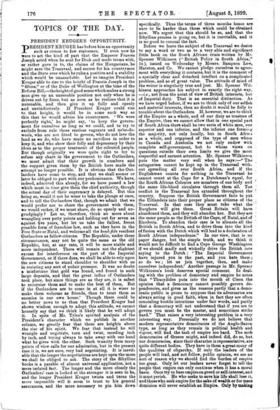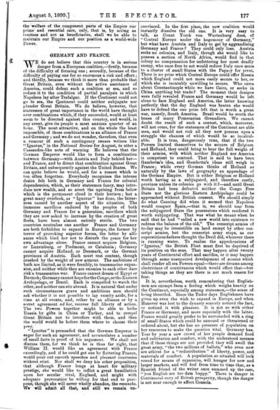TOPICS OF THE D.Y.
PRESIDENT KRUGER'S OPPORTUNITY.
PRESIDENT KRUGER has before him an opportunity such as comes to few statesmen. If even now he were to act the kind of part that the Emperor Francis Joseph acted when he sent for Doak and made terms with, or rather gave in to, the claims of the Hungarians, he might save the Transvaal, and secure for his countrymen and the State over which he rules a position and a stability which would be unassailable. Let us imagine President Kruger able to rise to the height of Francis Joseph in the "fifties," or of the Duke of 'Wellington at the time of the Reform Bill,—theheightof good sense which makes a strong man give up an untenable position not only when he is driven out by force, but as soon as he realises that it is untenable, and then give it up fully and . openly and unvindictively. If President Kruger could rise to that height, it would be in some such way as this that be would advise his countrymen. We were perfectly right,' he might say, to keep the govern- ment for ourselves as long as we could, and to try to exclude from rule those restless vagrants and ne'er.do- weels, who are not fitted to govern, who do not love the land as we do, who have made no sacrifices in order to keep it, and who show their folly and degeneracy by their ideas as to the proper treatment of the coloured people. But though originally we were quite right to try to refuse any share in the government to the Outlanders, we must admit that their growth in numbers and the support given them by the British have made the attempt no longer possible. It is obvious that the Out.. lenders have come to stop, and that we shall sooner or later be obliged to part with our predominance. We have, indeed, admitted this already, for we have passed a law which must in time give them the chief authority, though the actual day of their supremacy is delayed. But this being so, would it not be wiser to take the plunge at once, and to tell the Outlanders that, though we admit that we would prefer not to share the government with them, we would rather, if we must share, do so openly and un- grudgingly ? Let us, therefore, think no more about wrangling over petty points and holding out for seven as against five years, but let us take the fullest, freest possible form of franchise law, such as they have in the Free State or Natal, and welcome all the bona. -fide resident Outlanders as fellow-citizens. The Republic, under these circumstances, may not be quite the same as the old Republic, but, at any rate, it will be more stable and more independent. There will remain not the slightest excuse for interference on the part of the Imperial Government, or if there does, we shall be able to rely upon the new citizens to stand shoulder to shoulder with us in resisting any sort of unfair pressure. It was no doubt a misfortune that gold was found, and found in such large deposits, and that the great influx of Outlanders took place, but since things are as they are, it is safest to recognise them and to make the best of them. But if the Outlanders are to come in at all it is wiser to make them welcome as friends, than to treat them as enemies in our own house.' Though there could be no better news to us than that President Kruger had shown wisdom enough to adopt this attitude, we cannot honestly say that we think it likely that he will adopt it. In spite of Mr. Tylee's spirited analysis of the President's character which we publish in another column, we greatly fear that these are heights above the rise of his spirit. We fear that instead he will wrangle and negotiate, turn and twist, receding inch by inch, and trying always to take away with one hand what he gives with the other. Such tenacity from many points of view calls for our admiration, but in the present case it is, we are sure, very bad negotiating. It is inevit- able that the longer the negotiations are kept open the more we shall be obliged to ask. The story of the Sibylline books is a parable of almost universal application, not a mere isolated fact. The longer and the more closely the Outlanders' case is looked at the stronger it is seen to be, and the longer President Kruger twists and turns the more impossible will it seem to trust to his general assurances, and the more necessary to pin him down specifically. Thus the terms of three months hence are sure to be harder than those which could be obtained now. We regret that this should be so, and that the Sibylline process is going on, but it is inevitable, and it is no good to conceal the fact.
Before we leave the subject of the Transvaal we desire to say a word or two as to a very able and significant little book on the South African crisis written by Mr. Spenser Wilkinson (" British Policy in South Africa," Is.), issued on Wednesday by Messrs. Sampson Low, Marston, and Co. We cannot pledge ourselves to agree- ment with everything it contains, but it is the comment of a specially clear and detached intellect on a complicated problem, and so of great value. The attitude of mind of the writer is singularly true and just. Mr. Spenser Wil- kinson approaches his subject in exactly the right way. —i.e., not from the point of view of British interests, but of Imperial duty. That is an essential distinction. As we have urged before, if we are to think only of our selfish and material interests, then no doubt it would be folly to trouble about the Outlanders. If, however, we are to think of the Empire as a, whole, and of our duty as trustees of the Empire, then we cannot allow that in one special part of South Africa there shall be two sorts of white men, one superior and one inferior, and the inferior one formieg the majority, not only locally, but in South Africa as a whole, and composed of the type of men whom in Canada and Australia we not only endow with complete self-government, but to whose views on questions outside their own limits we give the most respectful and earnest attention. Mr. Spenser Wilkinson puts the matter very well when he says :—" The antagonism cannot be kept up in the Transvaal with- out spreading all over South Africa, and if the Englishman counts for nothing in the Transvaal he cannot count at the Cape for a Dutchman's equal, for the South African Colonies are members of one body and the same life-blood circulates through them all. Tne conflict in the Transvaal has extended throughout the country. Suppose the British Government fails to put the Uitlanders into their proper place as citizens of the Transvaal. In that case they must take what the Burghers will give them. Great Britain will have abandoned them, and they will abandon her. But they are the same people as the British of the Cape, of Natal, and of Rhodesia. To abandon their case is to alienate all the British in South Africa, and to drive them into the kind of fusion with the Dutch which will lead to a declaration of South African independence." In our view, that is no paper danger, but the simple truth, and we think it would not be difficult to find a Cape George Washington if we should madly and wickedly drive the British into saying to the Dutch : The Imperial Government have injured you in the past, and you hate them ; so do we ; let us join together, then, and make ourselves independent.' Another passage in Mr. Spenser Wilkinson's book deserves special comment. In deal- ing with the problem of democracy and empire he notes that " Thucydides puts into the mouth of Cleon the opinion that a democracy cannot possibly govern de- pendencies, and gives as the reasons partly that a demo- cratic public is prone to suppose that its adversaries are always acting in good faith, when in fact they are often concealing hostile intentions under fair words, and partly that a democracy will not understand that if you are to govern you must be the master, and sometimes strike hard." That raises a very interesting problem in a very interesting way. Personally we do not believe that modern representative democracies of the Anglo-Saxon type, as long as they remain in political health and vigour, will find the task of empire too hard. The mob democracies of Greece might, and indeed did, do so, but our democracies, since their character is representative, are quite different bodies. They have in them a great many of the qualities of oligarchy. If only the leaders of the people will lead, and not follow, public opinion, we see no sort of reason why we should find the burden of empire too great. Only let our leaders never forget to tell the people that empire can only continue when it has a moral basis. Once try to base empire on greed or self-interest, and it must perish. He who seeks to save his life shall lose it, and those who seek empire for the sake of wealth or for mere dominion will never establish an Empire. Only by making the welfare of the component Oka of the Empire our prime and essential care, only, that is, by acting as rustees and not as beneficiaries, shall we be able to maintain our Empire and our position as a world-wide Power.



































 Previous page
Previous page